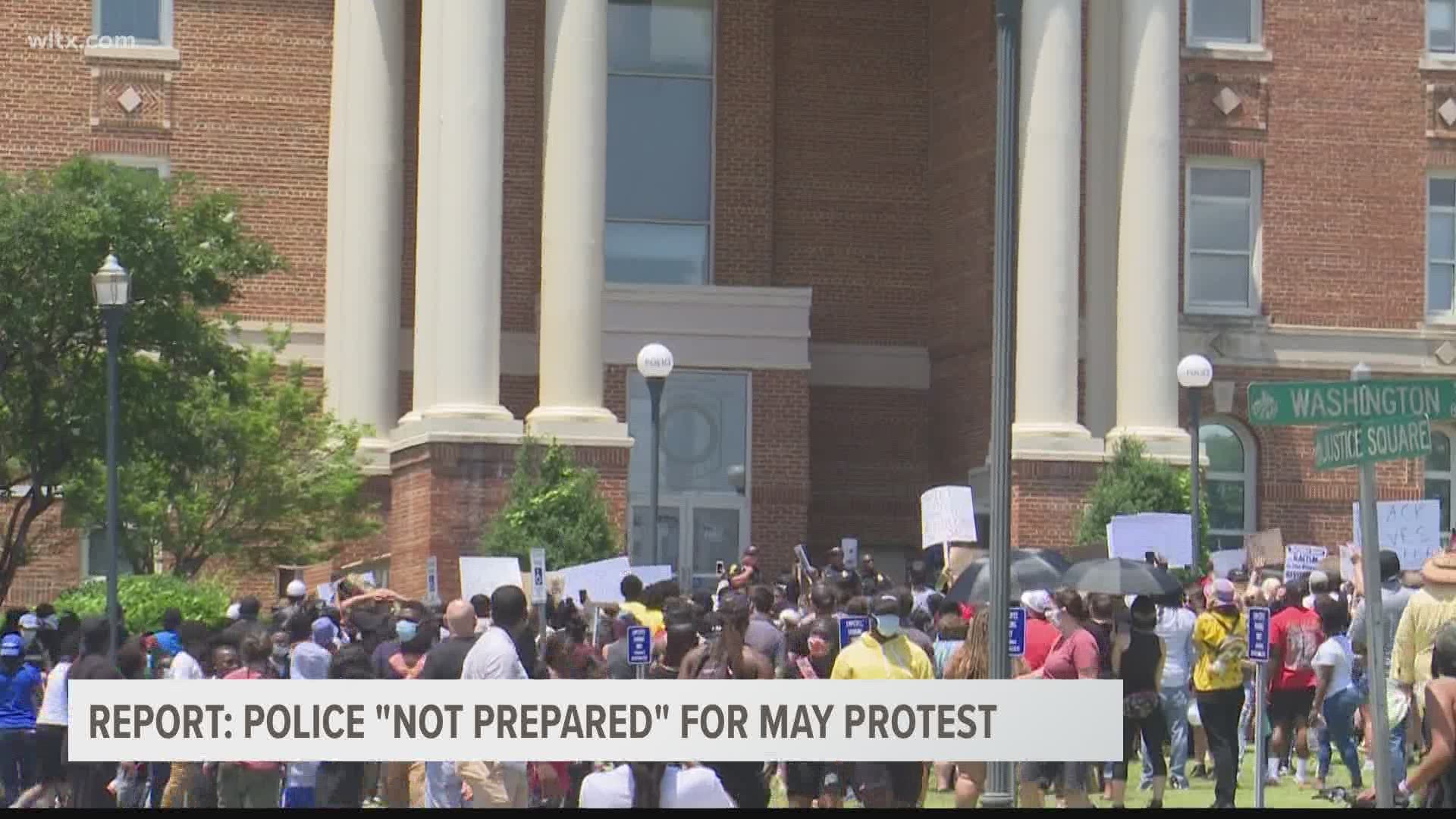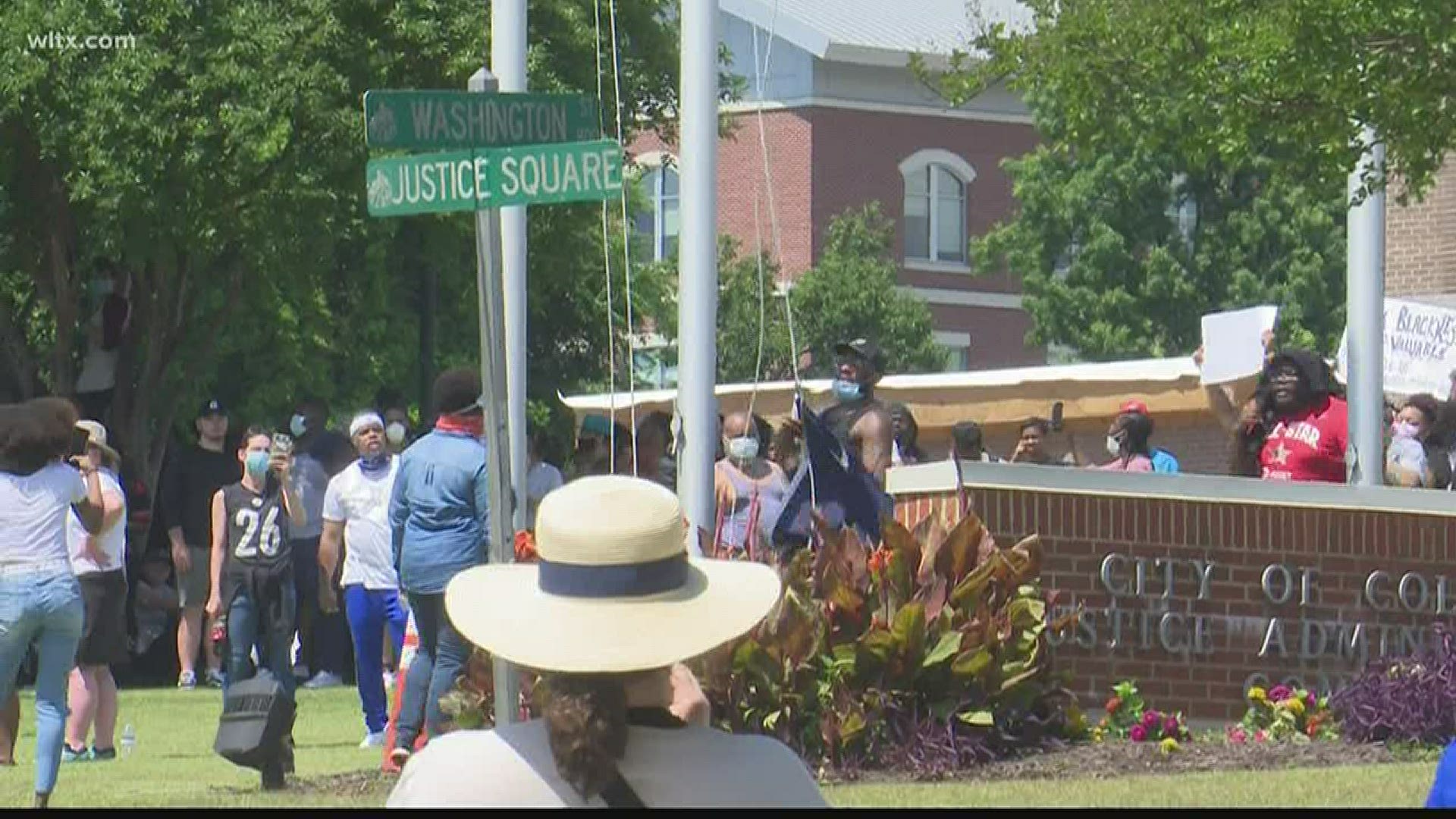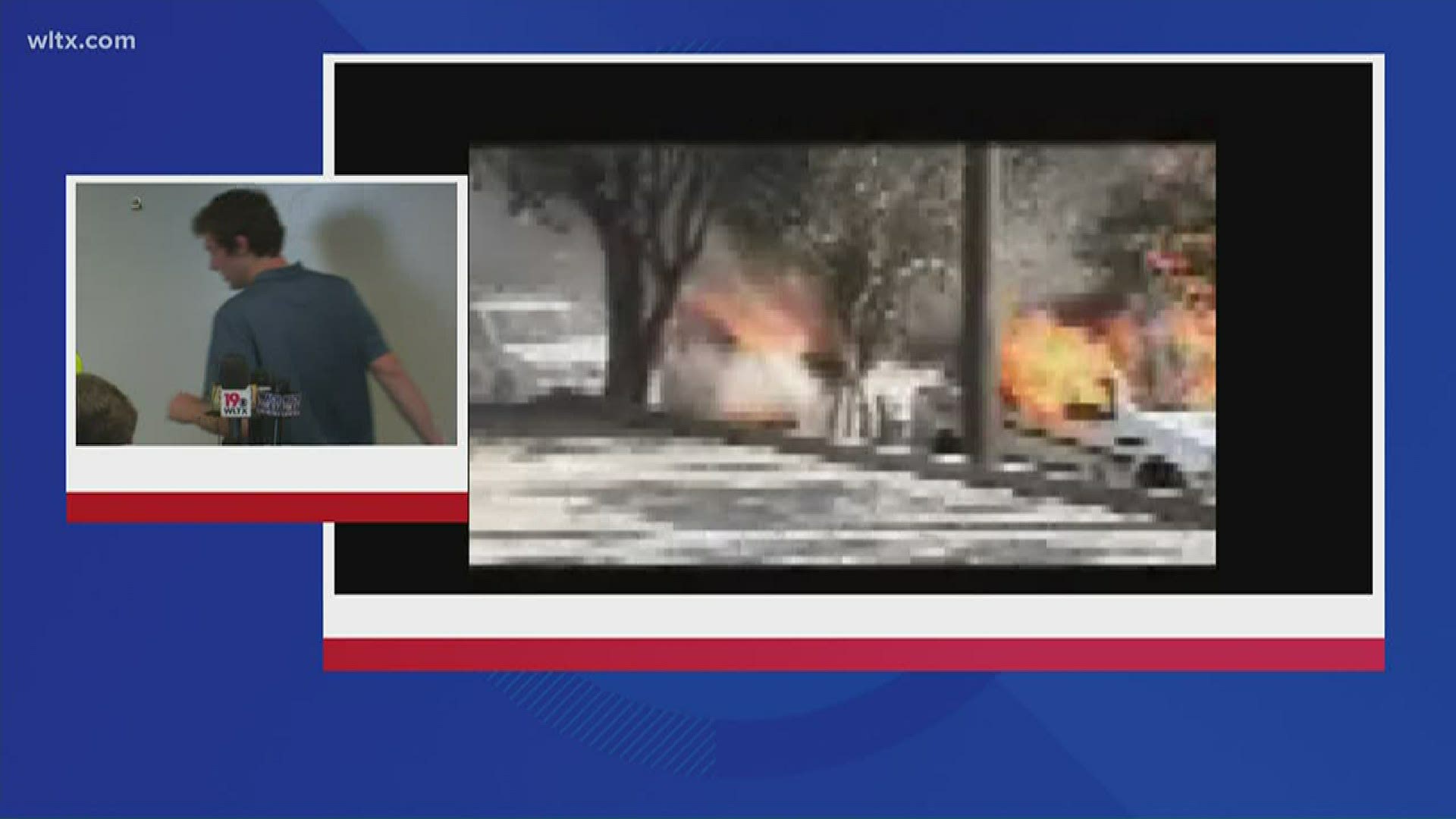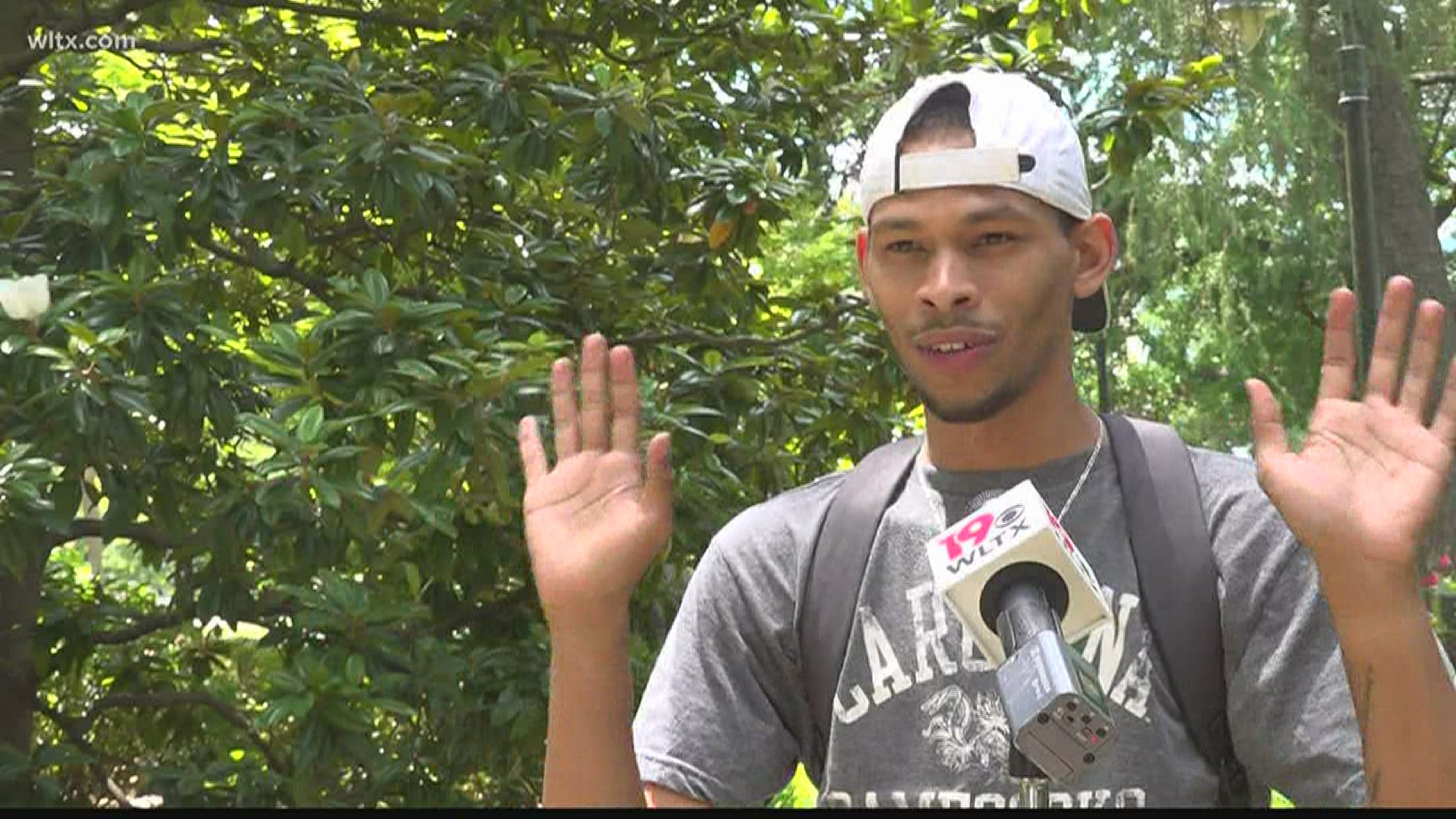COLUMBIA, S.C. — The Columbia Police Department released a 92-page report – CPD Critical Incidents Review 2020 – detailing the department’s response to the series of protests that occurred in Columbia beginning on May 30. The report lays out CPD’s actions and, in an effort of transparency, shortcomings related to the protests and plans for more effective future responses.
In a summary of the report, the agency found that their officers were not prepared for what took place, especially when violence broke out on May 30. It recommends more training for the specialized officers who would be among the first to respond to such an incident in the future.
According to the CPD report, the initial protests of May 30-31 were followed by 51 protests during the months of June and July.
Throughout the report, CPD cites the city’s history of small, peaceful protests and references the overall national mood at the end of May as possible contributing factors the department’s being unprepared for the events that occurred in Columbia the last weekend in May.
The entire report can be accessed here:
These are the highlights from the report:
- CPD starts out putting the situation to come in some context (underlined passages highlighted by WLTX):
“Numerous factors likely contributed to the unrest in Columbia, SC in late May 2020. Not only were we in the early days of a continuing pandemic, but there were a number of police-involved incidents that led to widespread protests across the nation. The majority of these protests were peaceful; however, many turned violent, fueling the already burgeoning climate of fear—whether of COVID-19 or encounters with the police. Columbia, SC was not exempt from this unease or the deepening social divisions that were emerging across the nation. Indeed, Columbia, SC was a microcosm: the police-involved shooting of Joshua Ruffin and the unsolved death of Knowledge Sims undoubtedly contributed to some local mistrust of the police, which was ignited by the police-involved death of George Floyd in Minneapolis on May 25, 2020. Floyd’s death was the catalyst for protests and rioting across the nation, including the civil unrest of May 30-31, in Columbia, SC.”
Joshua Ruffin, 17, was shot by a Columbia Police Officer after a foot chase during which Ruffin is shown on body cam footage pointing and firing a gun at the officer. Knowledge Sims, 7, was killed when someone opened fire on the family home. The case remains unsolved.
- The department says it was given only 24 hours’ notice in advance of the planned protest on May 30 and lacked time for planning:
“The Columbia Police Department did not receive notice of the protest planned for May 30, until May 29. Necessarily, this meant that there was an abridged planning timeline for this event. The organizers used social media to coordinate the event; however, CPD knew little more than what, when, and where the event was due to take place. This circumstance was exacerbated by groups applying for permits at the last minute or not applying at all.
"Protests had historically been peaceful in Columbia, SC and the CPD underestimated the level of feeling within the community. Therefore, the CPD did not anticipate violence and was not prepared for the degree or speed at which the violence escalated. Although the department had Mobile Field Force (MFF) teams available and had coordinated with assisting agencies, they were initially obliged to react to a situation in an attempt to regain control, rather than pro-actively maintaining control.”
Further in the report, in a timeline breakdown of the events of May 30, CPD states the planning session that did occur on May 29 placed an emphasis on protecting CPD Headquarters, off Lincoln Street in The Vista.
- CPD admits they were under-prepared and lacked up-to-date training:
“The MFF teams were under-prepared for the event. A group of officers underwent initial MFF training for the department to compose a couple of MFF teams approximately 3 – 4 years ago and, while there was some additional training since then, only new officers have received basic MFF training as they joined the department. The MFF has not conducted collective training as a unit since the initial training, which effected the quick organization and deployment of teams.
"Moreover, the civil unrest also brought to light the need for the Command Staff and other supervisors to conduct more training for critical incident management or planning as a group, which to fully understand their roles and responsibilities during critical incidents. This caused delays in providing command and control, and logistics support planning.”
- The police department acknowledges the incident planning that did happen was not thorough enough nor did it take advantage of available resources:
“The department typically conducts abbreviated planning, and did not effectively use the National Incident Management System (NIMS) and Incident Command System (ICS) to ensure comprehensive contingency planning took place with consideration of diverse threats, hazards, and events. This shortcoming, coupled with Columbia’s history of peaceful protests, may have affected some tactical decisions such as, where barriers would be placed, and the identification of triggers for the deployment of various less-than-lethal munitions.
"The written Incident Action Plan (IAP) for the May 30, 2020, protest was distributed the evening prior to the event, and contained broad incident objectives and command emphasis, as outlined in most of the department’s previous special events. The plan did not adequately address objectives or work assignments which may have been avoided with the assistance of the City of Columbia’s Office of Emergency Management. In the future the department will work with the Office of Emergency Management to ensure IAPs will better identify objectives, work assignments, and follow NIMS and ICS best practices.
"Logistics planning did not contain the thoroughness required for integration into the IAP for contingencies. For instance, transportation for MFF personnel from the CPD Annex facility was not planned and logistical support, in the event that the event was to stretch into the evening and through the night, was not in place (ex. water, food). Again, historically peaceful protests and the condensed planning timeline are likely reasons for this.
"However, the department demonstrated its flexibility and the close relationships it has with area partners by quickly coordinating transportation: It liaised with partnering agencies for the use of buses, as well as with the Columbia Fire Department, who assisted with transportation.”
- In-house CPD intelligence reports – advance warnings about protests and other events – were hampered initially by the method organizers used to get the word out about upcoming protests. CPD got a heads up from SLED about the first protest:
“The department generally has good intelligence focused on priority units, such as the Crime Gun Intelligence Unit. Normally, the SLED Fusion Center, the SC Bureau of Protective Services, and other partner agencies provide intelligence of threats or concerns regarding such events.
"The department received notification about potential protests from the Fusion Center on May 29, 2020. Additionally, the department had only a limited ability to monitor the organization of these protests, as most were orchestrated using social media; moreover, late applications for permits and groups not applying for permits limits the time available to gather intelligence and the quality of that intelligence.
"On May 31, 2020, the department redirected some of its intelligence personnel to focus on the protests, and increased coordination and communications with adjacent agencies, such as the Fusion Center and the Bureau of Protective Services. This redistribution of personnel meant law enforcement were able to better track officers, and also provided improved intelligence about what was happening in regard to the protests, as well as other, unrelated incidents/events.”
- CPD Command, Control and Communication were unprepared for the protests:
“Due to the infrequency of events of this nature, the Command Staff and other supervisors conduct training to fully understand their roles and responsibilities for incident management during critical incidents on a limited basis. This caused some delays in providing command and control.
"Command and control continually improved over the course of the incident and for subsequent protests. Communications also improved as the department adjusted how Incident Action Plans were briefed, which improved communications. Additionally, the department decentralized some of its radio communications by adding a command channel to avoid overloading the personnel and unit communications. Command, control, and communication continually improved over the course of the incident and subsequent protests. It’s also important to note that CPD’s close relationships and collaboration with other agencies greatly contributed to the department’s ability to successfully manage the events of May 30 and subsequent protests.”
The report also looks at the number of arrests -- 90 over May 30 and 31 -- and the charges brought against the alleged perpetrators -- mostly violation of curfew (38), looting (25) or breach of peace (25) -- and policy changes in regard to use of force by CPD arresting officers.
Columbia City Council voted unanimously to upgrade CPD's Use of Force Policy on June 16 to prohibit the use of carotid artery holds and choke holds, unless deadly force is deemed necessary.
According to the report, CPD deployed 18 rounds of Chlorobenzalmalononitrile (CS) gas (pepper spray), one flash-bang grenade and 2 beanbag rounds while attempting to disperse protesters on May 30; and 4 rounds of CS gas and 9 beanbag rounds on May 31.
The report concludes with acknowledging areas that need improvement -- information gathering and dissemination, communication (between departments, other law enforcement agencies and the community), training and planning -- and possible strategies to put in place to improve future outcomes when dealing with civil unrest.
The final paragraph of the report sums up the intent of CPD:
"The Columbia Police Department is fully committed to transparency and to learning from the unparalleled and extraordinary events of May 30-31, 2020. We strive to improve police practice and, more importantly, to further earn the trust of the community we serve. Through this process, we firmly believe that the department and the community can move forward together to bring forth what will undoubtedly be a better Columbia."




